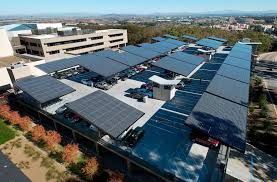Like developing any power project, developing a solar energy project is a complex process. For a solar energy project to be successful, the many parts of the development process must all come together. Typically, this process can take a number of years.
Site Selection: Is this the right location?
Many factors are evaluated in deciding whether a location is suitable for solar development. The following considerations need to be taken into account:
• exposure of the site to the sun over the course of the year, seasonal weather patterns, shading, and specific terrain features such as general orientation and slopes
• availability of sufficient, usable land
• proximity to utility electrical lines and substations that have room for additional power
• access to public roads
• environmental aspects of the site, such as the presence of sensitive species, wetlands or
past contamination
• local, state, and federal permitting requirements
• support of the local community
• cost of construction at the site, including steepness of grade, roughness, and soil conditions
Flexible Landowner Agreements: Are landowners interested in a solar project on their land?
A solar energy project requires one or more signed land agreements, usually in the form of lease or easement agreements. TGP works closely with each landowner to understand his or her unique circumstances and needs. Typical land agreements have a pre-construction period during which TGP will pursue solar resource assessment, environmental characterization, permitting, grid connection, power sales, site design and other development activities. If project development is successful, the pre-construction period is followed by project construction and then operations. Under a typical lease agreement, the operations period has an initial term of thirty years, with options for the project to extend up to an additional twenty years.
Environmental Review: What are the potential environmental impacts of the project?
TGP conducts environmental reviews at prospective sites in order to ensure that a project is compatible with the local environment. Such reviews help identify any threatened or endangered species or wetlands on the site, any historical or archaeological features of the site, and any previous environmental contamination in or near the site. The results of environmental assessments are used to design projects that minimize potential environmental impacts and to avoid sites where environmental impacts are unacceptable.
Interconnection Studies and Transmission Agreements: Can electricity generated by this project be transmitted to the utility grid?
TGP conducts electrical engineering studies to confirm that the utility grid can accept additional electricity. We then initiate a formal study process with the electric utility that ultimately results in an agreement to allow the project to connect and transmit electricity into the utility grid.
Permitting: Can the necessary permits be obtained for the project?
TGP determines what permits are necessary and what environmental, engineering and other studies are necessary or recommended to address environmental and permitting requirements. Permits may be required from local, state, and federal bodies and can include land use, environmental, sitting, building and other permits.
Power Sales Agreements: Is there a utility customer for electricity generated by the project?
A reliable and creditworthy power purchaser must be identified. TGP originates long-term power sales agreements with electric utilities or power marketers who purchase the electricity. TGP’s principals have originated and negotiated power sales agreements for many renewable energy projects across the U.S.
Project Financing: How will financing be arranged?
Access to capital is critical for renewable energy projects. Financiers will consider the quality of the project and the project team’s track record in developing and completing successful projects. TGP’s experience encompasses development and construction finance, term loans, and highly structures equity investment. TGP’s principals have been involved in the development, sale, and financing of thousands of megawatts of renewable energy projects in the U.S. and overseas, and have developed strong relationships with a select group of financial institutions and energy companies in the financing of power projects.
Equipment Procurement and Construction: What is the best equipment and who is the best contractor to install it?
TGP is not affiliated with any single manufacturer of solar equipment, and this independence allows us to procure the most competitive, reliable, and technically suitable equipment for each project. In addition, we have extensive experience negotiating engineering, procurement, and construction (EPC) contracts for renewable power projects, and in working with the major renewable power (EPC) contractors.
